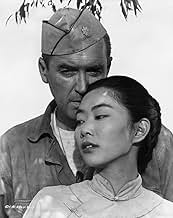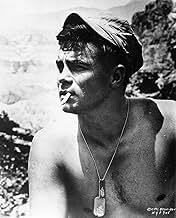The Mountain Road
- 1960
- 1 घं 42 मि
अपनी भाषा में प्लॉट जोड़ेंA US Army Major stationed in East China in 1944 is ordered to blow up military installations in order to slow down the advancing Japanese Army.A US Army Major stationed in East China in 1944 is ordered to blow up military installations in order to slow down the advancing Japanese Army.A US Army Major stationed in East China in 1944 is ordered to blow up military installations in order to slow down the advancing Japanese Army.
- Sgt. 'Mike' Michaelson
- (as Henry 'Harry' Morgan)
- Bit Role
- (बिना क्रेडिट के)
- Chinese Captain
- (बिना क्रेडिट के)
- Bit Role
- (बिना क्रेडिट के)
फ़ीचर्ड समीक्षाएं
The film shows the challenges of military command and conflicts that the lead character, Major Baldwin has. James Stewart plays that part very well. His conflicts are different in that most of his decisions about blowing up bridges, roads and even buildings in villages affect hundreds of civilians.
All of the cast are very good in their roles. Among the most prominent are Lisa Lu who plays Madame Sue-Mei Hung, Harry Morgan who plays Staff Sgt. Mike Michaelson and Glenn Corbett who plays Collins.
An interesting aspect of this film is that there are no Japanese soldiers. The Americans never encounter the enemy. The film depicts some of the aspects of the Chinese culture that Major Baldwin had not yet learned. The terrain looked like it could have been filmed in China, but was mostly rugged hilly country and mountains in Arizona.
The film has some impressive scenes of explosions. Some consider it an anti-war film, and it fits that mold of most war movies that show the horrors, death, destruction and insanity of war.
It's a good film, but not great. War film buffs and those who enjoy history should enjoy it. Others, especially modern audiences used to fast and furious entertainment, may find it hard to sit through.
The best line in the film is from Alan Baxter who plays Gen. Loomis. After Stewart's character tells him that he had asked for the command, Loomis says, "You know what command is, major?" Maj. Baldwin replies, "Well, sir, the book says... " And Gen. Loomis says, "Command is power. Pure, simple, unlimited."
One of those who did was Theodore H. White who in the year before his first Making of the President books came out wrote the novel on which The Mountain Road is based. White was a correspondent during World War II and he covered this forgotten theater of the war where more time was spent in the quarrels with American commander Joseph Stilwell and Generalissimo Chiang Kai-Shek of the Kuomintang Nationalist Chinese forces than in actually fighting the Japanese.
The year is 1944 and the Japanese army is once again on the offensive and the Chinese are retreating deeper into their interior. Stewart heads an eight man army demolition team and he's destroying a whole lot of things useful to the advancing Japanese, scorching the Chinese earth for the invaders.
But he's in a country that the only things Americans know about it come from missionary tales, Pearl Buck novels, and Charlie Chan movies. Which would make Stewart's character no different than most of the rest of his countrymen. One of the people in his team is the Chinese speaking Glenn Corbett who's studied the language and culture.
In this war movie, we never see the Japanese. Stewart's big problems come from the mass of refugees heading west to escape the advancing Japanese. He's also dealing with conflicting orders, with Chinese commanders looking to evade responsibility, and some outright bandits who really don't care who wins the war.
Four of the team are killed and the reprisals Stewart takes cost him the affection of Lisa Lu, widow of a Chinese general who chose wrong politically and paid for it.
Actually the performance I liked best in the movie is that of Frank Silvera as a Chinese Kuomintang commander who actually does understand and sympathize with Stewart, but who also knows his people.
My guess is that James Stewart took this film because it's not a typical war film with no great combat scenes. It's about the responsibility of command in a war where you can't tell whom you should fear.
Still The Mountain Road drags in spots and comes to no real satisfactory conclusion. It's different, but because of that remains one of James Stewart's least known and viewed films.
Stewarts characters struggle with power and his obsession to accomplish his objective was fun to watch. This film is worth the time spent and includes some great character actors of this period. I think it deserves its 6.6 overall rating.
Watching this movie develop reminded me of recent events in europe and made the film seem timely despite its age.
क्या आपको पता है
- ट्रिवियाThe film includes themes considered to be taboo for Hollywood during the war years, such as tensions between allies and racism among Americans.
- गूफ़When Baldwin and his unit arrive at the ammunition dump they're supposed to blow up, it consists of several small buildings and shacks. But the interior shots showing mountains of ammunition have no resemblance to the buildings they're supposed to be in: two of them are clearly gigantic tunnels ten or twenty times as long as the buildings that are supposedly being inspected.
- भाव
Major Baldwin: Colonel, I'm gonna blow up this road. Now, how can we keep the people off?
Col. Kwan: Off?
Major Baldwin: Well, I-I, I need them stopped for about ten minutes. Can you do it?
Col. Kwan: How?
Major Baldwin: Well, uh, how 'bout, uh, how 'bout if we get a couple of empty gasoline drums, put 'em on either side of the road, stretch a rope across.
Col. Kwan: They'd go under the rope.
Major Baldwin: Well, then we get some Chinese soldiers to explain to them, explain to them that we're cutting the road. How 'bout that?
Col. Kwan: The soldiers will want to get through themselves.
Major Baldwin: Well, could we give them something?
Col. Kwan: What?
Major Baldwin: Well, money?
Col. Kwan: They cannot spend money here.
Major Baldwin: Well, food. How 'bout food? We got 'K' rations, cigarettes. How about cigarettes? What'll they take for the job?
[Kwan Says something in Chinese]
Major Baldwin: [Angrily] I don't speak Chinese, Colonel.
Col. Kwan: There is no way.
- कनेक्शनFeatured in Hollywood Chinese (2007)
टॉप पसंद
- How long is The Mountain Road?Alexa द्वारा संचालित
विवरण
- रिलीज़ की तारीख़
- कंट्री ऑफ़ ओरिजिन
- भाषाएं
- इस रूप में भी जाना जाता है
- El camino del odio
- फ़िल्माने की जगहें
- Stewart Mt. Roads, Salt River Canyon, एरिज़ोना, संयुक्त राज्य अमेरिका(refugee road sceens)
- उत्पादन कंपनी
- IMDbPro पर और कंपनी क्रेडिट देखें
- चलने की अवधि1 घंटा 42 मिनट
- रंग
- पक्ष अनुपात
- 1.85 : 1
इस पेज में योगदान दें


































